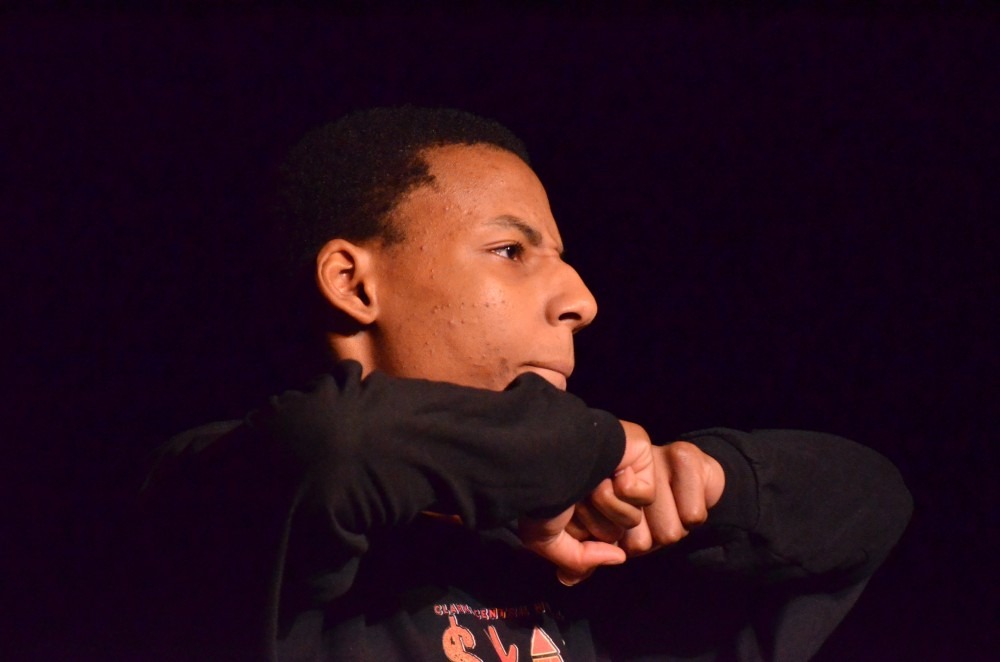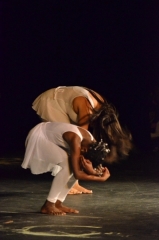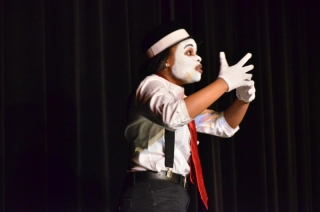
By AUSTIN DeFOOR – Web Master
Clarke Central High School celebrates black history by performing a play.
On Friday, March 9, the Clarke Central High School Black Student Union, in conjunction with the CCHS step team and several other guest singers, dancers and speakers, performed “I know I’ve been Changed!” The performance, much like a variety show, compiled several acts together that were all tied to a central message.
Before the show began, there was a slideshow playing that displayed several celebrities that had changed their lives for the better. People such as civil rights activist Malcolm X, singer and rapper 50 cent, President Barack Obama and CCHS alumni and reality T.V. star Ne-Ne Leaks were shown, as well as several non-African-American celebrities, showing that change should be evident in all races and ethnicities.
The Black History Play’s first act was a ballet number combined with a gospel song. Photo by Carlo Nasisse.
The first act of the performance was a musical number combined with ballet dancing. As senior Shaquira McGrath began with the gospel “I know I’ve been changed,” dancers began entering from all sides of the stage. The dancers portrayed the tone of the music as the audience of students, teachers and visitors absorbed it. When the act was done, students yelled and applauded for the opening act.
When the curtains opened for the second act, there was a group of chairs sitting in the middle of the floor and a small white board in front of them all. Senior Rose Murphy, also the script writer of the show, portrayed Ms. Lewis, a teacher struggling to get her class in order. As the “students” entered in an unorderly fashion, she instructed them to sit down and pay attention, and that they were learning about black history today. The students failed to comply and were not engaged with what the teacher had to say. Ms. Lewis then gave them the assignment to take 15 minutes to write a poem about the subject. After the time had passed, one student rose and delivered a poem that received much applause.
After the skit and a brief intermission, the CCHS boys and girls step teams took the stage to perform individually, and then as a whole. Their goal was to promote unity and togetherness. Senior Jermaine Barnett then entered the stage and sang “A change is gonna come” by Sam Cooke.
The next act was a praise dance entitled “He saw the best in me” by Marvin Sapp. The act, which included mimes and interpretive dance, portrayed how God saw the best in people while everyone saw the worst, and that this is encouragement for change.
A group of students came together to perform an interpretive dance by miming. Photo by Carlo Nasisse.
CCHS’ Black History Choir then backed up office administrator Linda Glenn in the singing of “Everything’s gonna be all right,” followed by counseling office secretary Jaime Bonds with “He changed me.” Bonds, before she sang, shared her story of her childhood. She talked about how she grew up in foster care and wondered why her parents didn’t want her, and how that affected her self-esteem as a teenage. She also shared that she became pregnant and 16 and homeless at 18, leading her to make the changes in her life she has today. Both of the women’s’ gospel numbers spoke to the audience. Following this, a skit entitled “The Waiting Room” portrayed the modern-day stereotypes of African-Americans.
Social worker and family activist Deborah Lonon then spoke about her immigration from Nigeria to America in 1986 and how there is hope for everyone. A man by the name of Life finished the speech. Life, a high school dropout turn University of Georgia graduate shared with the audience how people are programmed to think, and that the bad is overshadowed by the good.
Time ran short, and it was announced that the last act, a poem by Murphy, would not be able to be done. Students responded with discontent and said, “We want more!” repeatedly. As the auditorium began to empty, Murphy took the stage and began reciting her poem; only to grab the attention of a small group of students, though.
Throughout the performances, the light of students’ cell phone screens lit up the auditorium. The students were not texting, however, they were recording performances throughout the show.



















